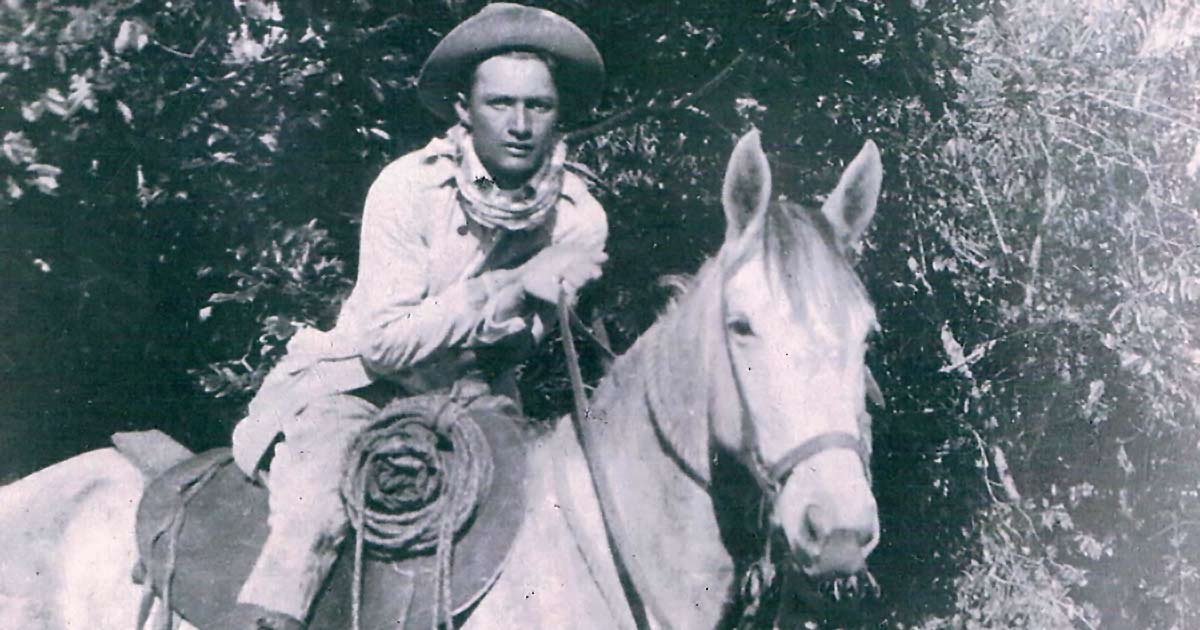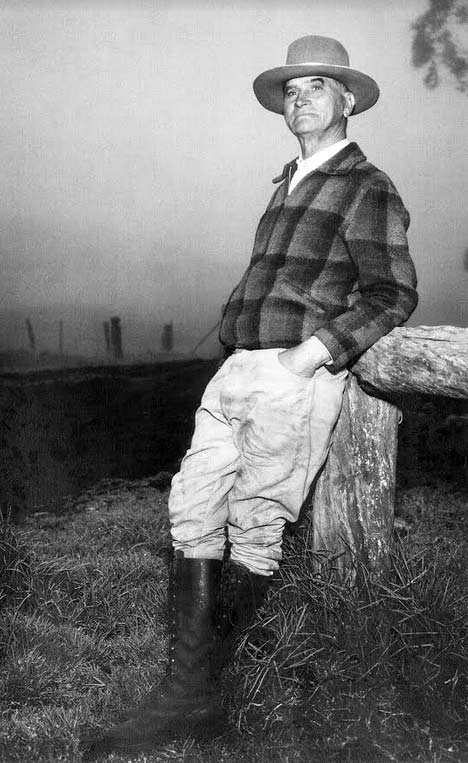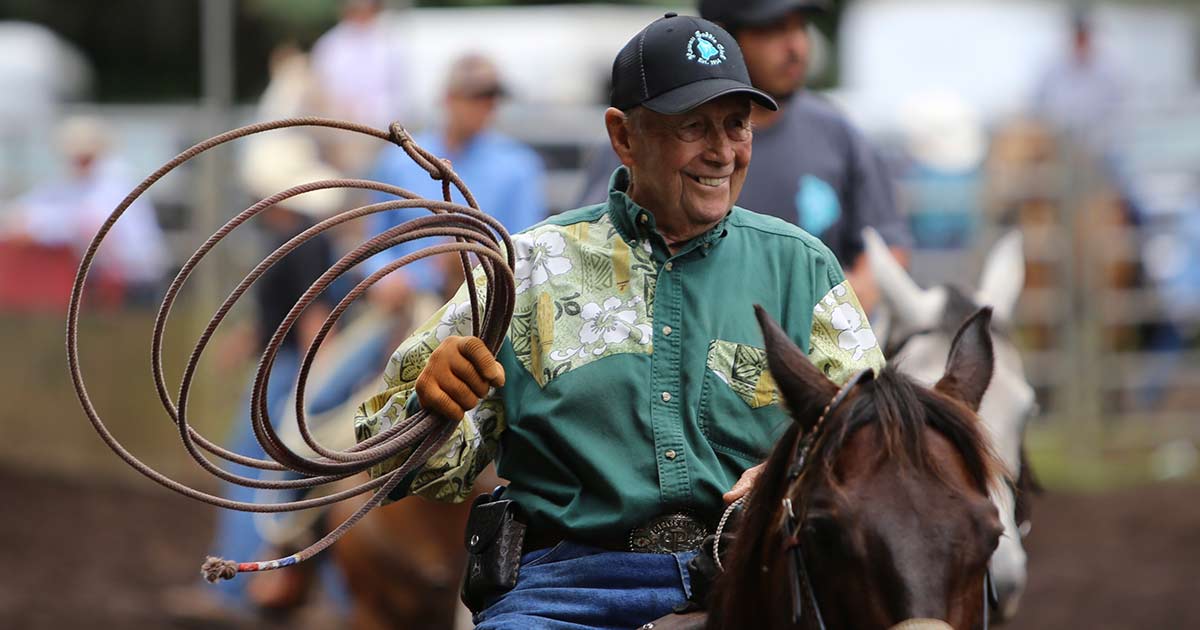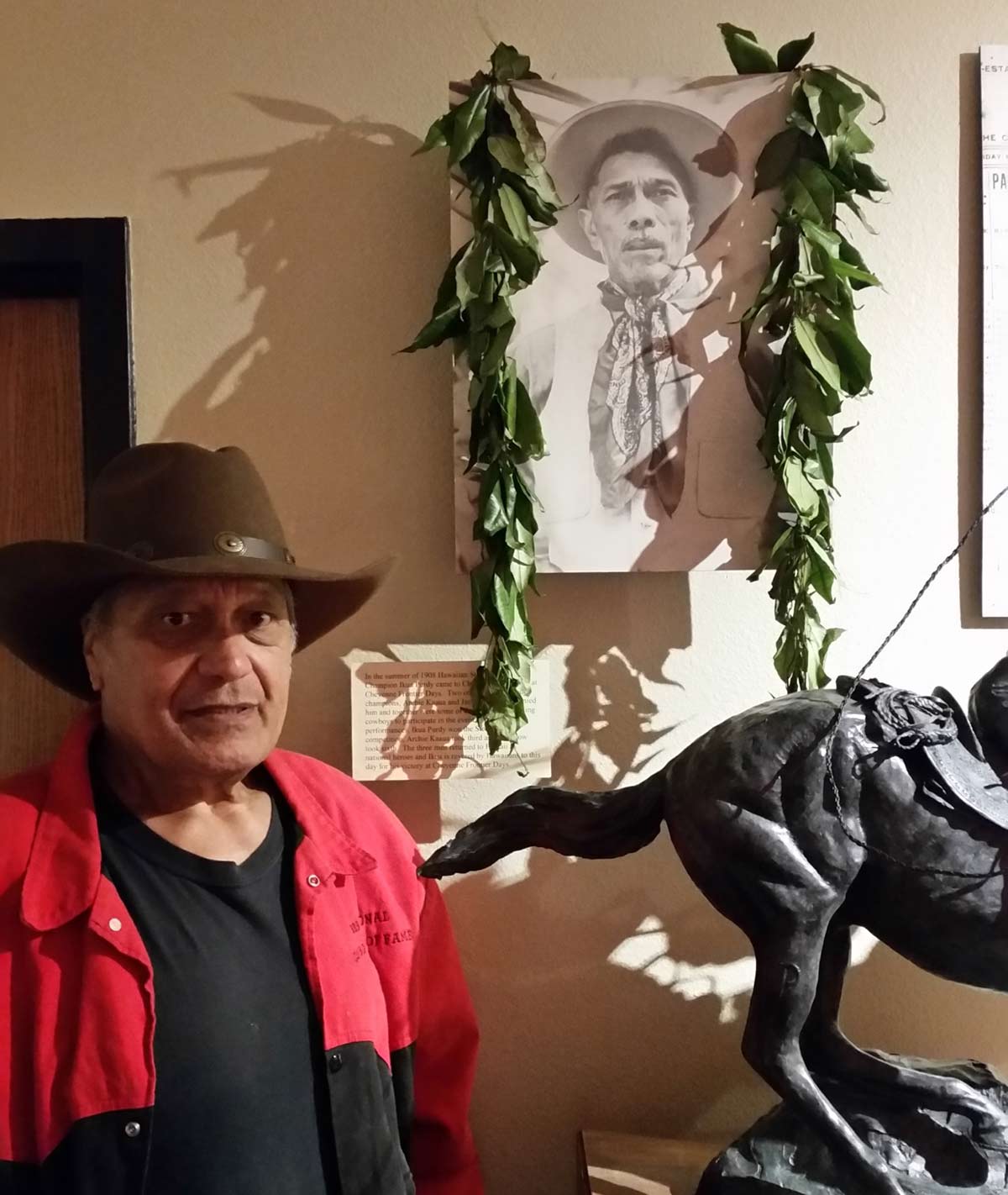
Archie Kaʻauʻa – Photo by Archie Kaʻauʻa, Jr.
Your Paniolo Preservation Society stands up for cowboys and cowgirls from around the world, sharing our common values of hard work, team work and trust, a responsibility for family, and love of the land. Looking back on our history, we see Hawaiʻi’s paniolo representing a rainbow of cultures, each of whom brings their own strengths into the shared experience, and we are better for it.
The first actual paniolo of course were Hispanic, invited from Mexico by King David Kalākaua in 1836. By this time, the wild pīpī, cattle, were practically out of control and the king had admired these Vaqueros on a trip to America. Vaqueros brought and shared their skills in riding, roping, saddle making and other ranch work, along with a new kind of musical instrument for Hawai‘i, the guitar, and kī hōʻalu, slack key.
Hawaiʻi Cattlemen’s Association Paniolo Hall of Fame (PHOF) shares many examples of our multi-ethnic paniolo. For example, Parker Ranch Founder John Palmer Parker arrived to Hawai‘i in 1809. A Caucasian, he found favor with King Kamehameha I, and helped control the wild cattle that overran the countryside, setting up a beef and tallow business in the process. He married an ali‘i wahine, Kipikane, and their half-Hawaiian descendants helped create an historic dynasty that continues in trust today as the Parker Ranch Foundation Trust.
Portuguese paniolo arrived near the end of the century, bringing their particular skill sets and music, most notably the ‘ukulele. Numerous multi-generational families make up the Big Island’s paniolo community, such as Jose “Joe” Correia who came to Hawai‘i with his family from Lisbon, Portugal in 1895. At the age of 15, he went to work for Kūkaʻiau Ranch in Paʻauilo, and remained there for 72 years.
 Jose “Joe” Correia
Jose “Joe” Correia
William J. “Willy” Andrade, Sr.’s grandparents came to Hawaiʻi from Portugal in 1876. His father opened a small family business, J J Andrade Slaughterhouse, which became Hawaiʻi Beef Producers LLC, and is still in operation. Willy worked his father’s ranch in Ahualoa until he built up his own, and his five children have followed in his footsteps. The rodeo arena in Honokaʻa is named for his mother, Rose DeSilva Andrade (who later married Dan Correia, Joe’s son!)

William J. “Willy” Andrade, Sr. – Photo courtesy Nancy Erger
About the same time, Japanese paniolo were joining Hawaiʻi’s ranch life and many “Paniolo Kepani” became legendary for their achievements and contributions. Matsuichi Yamaguchi, whose parents immigrated to Hawaiʻi in 1895, was a skilled horseman and dedicated worker. He stayed on with Parker Ranch after his parents returned to Japan, and worked there until his tragic death from a horse accident in 1936. Matsu left behind a widow and eight children, who remained on the ranch for 50+ years. He was inducted into the Paniolo Hall of Fame in 2013, joining his son Jiro, one of the most celebrated cowboys and saddle makers in Hawaiʻi, inducted into the PHOF in 2002.
Parker Ranch employed an African American man named Wally Jackson, hired by A.W. Carter as a groomsman for the Thoroughbred program. Mr. Carter would not just hire anyone, and bring them all the way from Kentucky, if he didn’t see their great potential and talent. Jackson had a gift with horses and Mr. Carter knew that the Ranch would benefit from Jackson’s knowledge and skill in training and marketing of the Thoroughbred colts.
Unlike sugar cane plantation workers, who spoke pidgin drawn from many languages, the paniolo adopted ‘Olelo Hawaiʻi as its standard speech. Hawaiian families—Kealoha, Ho‘opai, Keakealani, Akau, Kaniho, and many others—are at the heart of the paniolo culture, carrying on the traditions of their ‘ohana with pride, from generation to generation.

Legendary paniolo Ikuā Purdy was the first Hawaiian inducted into the National Cowboy Hall of Fame. In 1908, Ikuā , along with Archie Ka‘au‘a, and Jack Low competed in the Cheyenne Wyoming Frontier Days championship rodeo. These three remarkable cowboys wowed the western crowd, won titles, and carved a place in history for the paniolo. Ikuā ’s grandson Michael was inducted into the PHOF in 2019. And, just this month, a lei from Michael was buried in the arena where Ikuā became champ.
